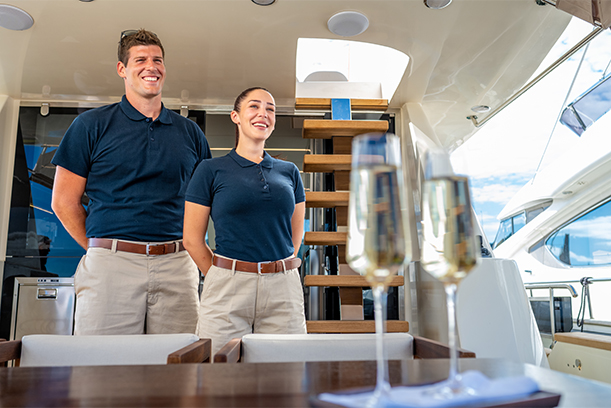 RELEASE DATE: 5/12/18
RELEASE DATE: 5/12/18
The results of new research into the welfare needs of superyacht crew were announced on Monday at a seminar held at Inmarsat’s headquarters in London.
The International Seafarers’ Welfare and Assistance Network (ISWAN) partnered with MHG Insurance to conduct a survey of seafarers who work on superyachts to investigate welfare issues specific to the sector, backed up by in-depth interviews and diary studies. Based on responses from 402 superyacht crew responding to the 50-question survey, the report finds:
· 82% had experienced low crew morale ‘sometimes’, ‘often’ or ‘always’
· 77% of women, and 55% of men, had experienced problems with on-board leadership ‘sometimes’, ‘often’ or ‘always’
· 67% ‘usually’ or ‘always’ felt rested in port
· 79% were on permanent contracts
· 51% were satisfied with their leave entitlement
· 57% of women and 39% of men suffered from social isolation or loneliness ‘sometimes’, ‘often’ or ‘always’ while working on board.
Yachting offers wonderful opportunities and this side was revealed in the report in quotes including: ‘Yachting delivers beautiful adventures to remote parts of the world…at a fraction of a cost that any other occupation can offer.’ It is also a hard life physically: ‘…you work bloody long hours without a day off in weeks during charters.’ The report covers the very good side of working on superyachts, without shying away from areas where improvements can be made: ‘I know a lot of yachts look after their crew but a lot don’t.’
The recommendations of the report include the following:
· Improving recruits’ knowledge of what to expect on board before they go to sea
· Improved support for seafarers who are coming out of the superyacht sector
· Raising awareness of what support for wellbeing is out there for seafarers, and widening distribution of welfare materials and information to include yacht crew
· An increase in the availability of rotational posts, which would make a concession to family life
· Enabling more time for rest and relaxation
Rob Myers – Senior Director, Large Yacht and Passenger at Inmarsat, the seminar host – opened the launch in London by introducing Inmarsat’s recent work on improving superyacht crew communications. Dr Olivia Swift, who conducted the research for ISWAN, presented the results to delegates and a panel then addressed three key discussion points stemming from the report: gender, religion and leadership. The panel members were:
Andrew Wright – Secretary General at The Mission to Seafarers
Karen Passman – Founder of Impact Crew
Peter Dudzinski – Director, Underwriting Services at MHG Insurance
Nicola Morgan – Director, Recruitment Manager & Shore Based Positions at wilsonhalligan
Danny McGowan – Strategic Organiser at Nautilus International
Richard Le Quesne – Financial Director & Honorary Treasurer at the Professional Yachting Association
Commenting on the report, MHG Insurance’ Chairman and CEO Andrew Dudzinski said: ‘How can we expect to recruit and retain loyal crew tomorrow if we don’t understand their welfare concerns today?’
The research was described by seminar delegates as ‘long overdue’ (Dùghall macLachlainn, a superyacht captain), at the ‘forefront of development of crew welfare’ (yacht recruitment agency wilsonhalligan), and ‘a step in the right direction for the future of superyachting in a modern world’ (Sara Ballinger, Crew-Glue).
ISWAN’s Executive Director Roger Harris said: ‘The research highlights some real concerns of crew working on superyachts that need to be addressed by the sector. We are grateful to MHG Insurance for funding the research and to The Mission to Seafarers for supporting it.’
Andrew Wright, Secretary General at The Mission to Seafarers, said: ‘I was absolutely delighted to attend the excellent superyacht seminar. The findings of the study confirm my own experience of the industry and were properly thought-provoking. This is an area of need which has been insufficiently on the radar of most maritime welfare organisations. At The Mission to Seafarers we are determined to take forward current discussions. Working with partners, we are looking to develop appropriate kinds of support, focused on identified areas of need and using our particular skills and experience.’
The report can be downloaded here: www.seafarerswelfare.org/resources/publications/the-welfare-of-superyacht-crew.
For further information, please contact:
Tom Holmer
ISWAN, Croydon, UK
Telephone: +44 20 8253 0163
tom.holmer@iswan.org.uk
Mobile: +44 7807 311852
Diana Gonzalez
MHG Insurance, Florida, USA
Telephone: +1 954 548 3581
dianag@mhginsurance.com
Mobile: +1 954 232 2957
The results of new research into the welfare needs of superyacht crew were announced on Monday at a seminar held at Inmarsat’s headquarters in London.